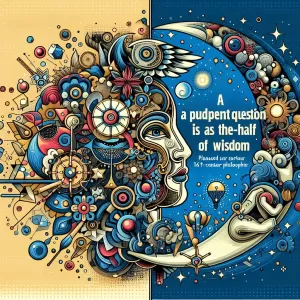
Tibetan Proverb: You own only what you can let go of.
Author: Tibetan Proverb
👁️ 11 views
The Tibetan proverb "You own only what you can let go of" conveys a profound philosophical perspective on attachment and ownership, encouraging a detachment from material and even emotional possessions. At its core, the proverb suggests that true ownership doesn't derive from physical possession or control but from the ability to relinquish one's hold on objects, people, or concepts. When we think of ownership, we often think of control or possession—having something under our power or within our domain. However, this proverb turns conventional wisdom on its head by suggesting that real ownership is best demonstrated through the capacity to let go. This can be interpreted in several ways. For one, it emphasizes the impermanence inherent in all things—nothing lasts forever. Thus, clinging to temporary possessions can lead to suffering and dissatisfaction as they inevitably change or fade. Moreover, by letting go, we demonstrate mastery over our attachments. If we can release something, it no longer has power over us, suggesting a sense of freedom and strength. This reflects a belief found in many spiritual traditions that freedom from attachment is a pathway to inner peace and liberation. In a broader sense, this proverb encourages mindfulness and self-awareness. By fostering a mindset of non-attachment, we are likely to cultivate healthier relationships with our belongings, ideas, and relationships, fostering a space for growth and resilience. Ultimately, the essence of the proverb centers on understanding that genuine ownership isn't about control but about conscious and deliberate release, cultivating an inner sense of abundance and enlightenment.
Quote By: Tibetan Proverb

With the right approach, clear plans, and courage, even Mars can be conquered...
👁️ 46 views
Author:
Maye Musk
#inspirational quotes

Do not seek to follow in the footsteps of the wise. Seek what they sought. - ...
👁️ 28 views
Author:
Basho
#inspirational quotes

There is no relationship without arguments and resentment. Strong people figh...
👁️ 24 views
Author:
M. Scott Peck
#inspirational quotes

Epictetus: Man is not worried by real problems so much as by his imagined anx...
👁️ 24 views
Author:
Epictetus
#inspirational quotes

Tibetan Saying: The mind is a guest. Let it arrive. Let it leave.
👁️ 21 views
Author:
Unknown
#inspirational quotes

Bushido Teaching: Victory without honor is another form of loss.
👁️ 20 views
Author:
Miyamoto Musashi
#inspirational quotes

Gurdjieff: Be aware of yourself everywhere and always.
👁️ 19 views
Author:
G. I. Gurdjieff
#inspirational quotes

A prudent question is one-half of wisdom. Francis Bacon
👁️ 19 views
Author:
Francis Bacon
#inspirational quotes
**The Wisdom of Tibetan Proverbs: A Reflection on Tibetan Culture**
Tibetan proverbs are an integral part of the rich tapestry of Tibetan culture, encapsulating centuries of wisdom, spiritual teachings, and the unique perspectives of its people. These short, pithy sayings offer insights into life, morality, and the interconnectedness of all beings, resonating deeply with the Buddhist worldview that permeates Tibetan society.
One of the most notable features of Tibetan proverbs is their ability to convey profound truths in a simple, accessible manner. The oral tradition of these proverbs has been passed down through generations, acting as a bridge between the past and present. They serve not only as a means of communication but also as moral guidance for individuals navigating the complexities of life. For example, one popular Tibetan proverb states, "A single arrow is easily broken, but not ten in a bundle." This saying emphasizes the strength found in unity and cooperation, a value that is essential in the tightly-knit communities of the Tibetan plateau.
The origins of Tibetan proverbs can be traced back to the ancient teachings of Buddhism, which encourage reflection, mindfulness, and the pursuit of wisdom. Authors and scholars have noted that these proverbs often reflect the harsh yet beautiful environment of Tibet, where the resilience and adaptability of its people shine through. Tibetan proverb collections are not just linguistic artifacts; they are a living testament to the cultural identity and philosophical underpinnings of a people deeply rooted in their land.
Moreover, Tibetan proverbs continue to inspire and educate, transcending linguistic and cultural barriers. As highlighted by Tibetan folklore and literature, these pithy sayings carry lessons about compassion, patience, and the importance of living harmoniously with nature and one another. The continued relevance of Tibetan proverbs in contemporary discussions about spirituality and cultural preservation underlines their timeless wisdom.
In conclusion, Tibetan proverbs are more than mere phrases; they encapsulate the essence of Tibetan life and thought. By exploring these proverbs, one can gain a deeper understanding of the values that shape Tibetan culture and the enduring wisdom that can guide our own lives. Through the lens of Tibetan proverbs, authors and thinkers alike can continue to reflect on the profound lessons they impart, ensuring that this rich cultural heritage is celebrated and remembered for generations to come.